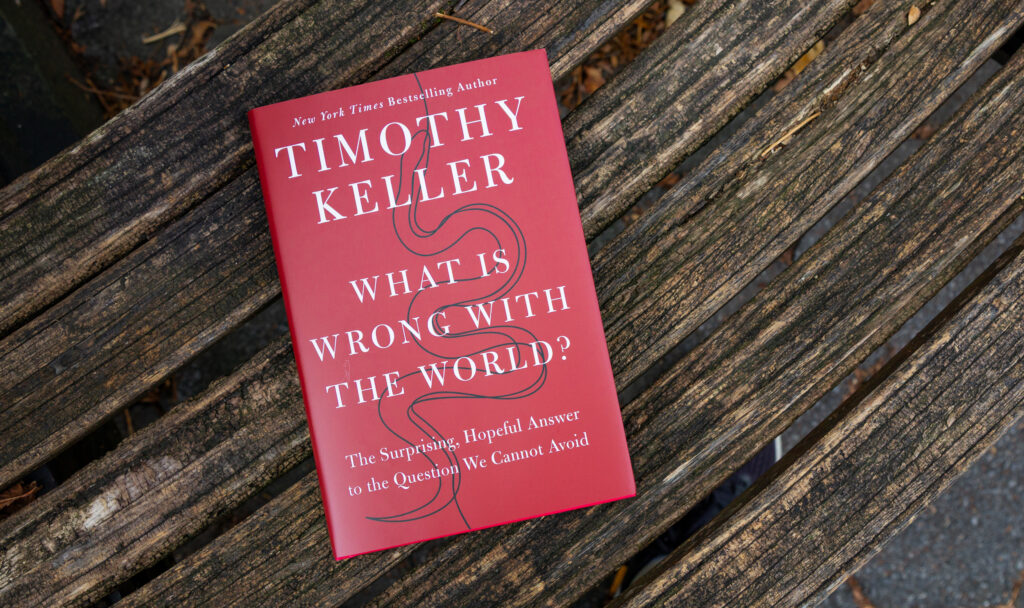This is an article originally written for the Redeemer Report in 2003. In it, Dr. Keller looks at how sin is viewed in the Bible in comparison to how today’s culture responds to the term and its meaning. He also shows how when Christians rightly understand that everyone is equally a sinner, it revolutionizes how we relate to others in the world who don’t have the same beliefs.
In Luke 11 Jesus is instructing his followers on the subject of prayer, and in the midst of it he says, “if you then, though you are evil, know how to give good gifts to your children, how much more … your Father in heaven …?” This reference to his own disciples as evil is what we would call “off-handed.” It is a casual comment that reveals an astounding (to modern readers) assumption of Jesus: namely, that even the best human beings are so radically corrupt that they can be referred to as “evil” persons. Nevertheless, though he calls them “evil,” it is obvious that Jesus loves his disciples with the utmost tenderness and even delight, and is willing to pay the ultimate price for them (John 13:1; 17:20-26). Obviously, this is a totally different view of “sin” and “evil” than exists in the world today. No one, apart from those who hold Jesus’ view of sin, can look at their friends and family, take genuine delight in them, and yet say, “I love them—but they have lots of evil in them! And so do I!”
What then is the biblical view of sin? Sin is a distortion and dislocation of the heart from its true center in God (Romans 1:21-25). This is expressed in a basic motive for all human life—the heart desire of every person to be his or her own Savior and Lord (see the serpent’s original temptation in Genesis 3:5: “you will be as God”). Kierkegaard used very modern terms when he defined sin as building your identity on anything besides God. That is just another way to put across the old biblical themes of idolatry, self justification, and self-glorification.
Sin, therefore, is something that everyone is doing all the time. (See Romans 1:18-3:20 with the summary in 3:20.) People who flout God’s moral law are doing this overtly, of course. But even moral religious people are trying to be their own saviors by earning salvation and being good. It is just as possible to avoid Jesus as Savior (and be your own savior) by keeping God’s law as by breaking it. Everyone is separated from God equally—regardless of the external form of behavior.
It is the fundamental motives of self-justification and self-glorification that distort our lives and alienate us from God. And until a person is converted, these principles operate as the main motive for everything we do. This is true in every culture and class of people. In the ultimate sense, then, everyone is equally a “sinner” in need of Jesus’ salvation by grace alone.
Once this radical view of sin is grasped, it revolutionizes the believer’s attitude toward others in the world who do not share his or her beliefs.
Once this radical view of sin is grasped, it revolutionizes the believer’s attitude toward others in the world who do not share his or her beliefs. Here are two ways it changes you in this regard.
First, it means you sense (now more than ever) a common humanity with others. The biblical view significantly changes (in Christians) the natural and traditional human attitudes toward those who behave in ways in which they do not approve. It is normal for human beings (whose hearts are always seeking to justify themselves and who are always trying to make the case that they are one of the “good guys”) to divide the world into the “good” and the “bad.” But if everyone is naturally alienated from God and is “evil” then that goes for everyone from prostitutes to ministers.
So the biblical teaching on sin shows us the complete pervasiveness of sin, and the ultimate impossibility of dividing the world neatly into “sinful people” and “good people.” It eliminates the attitudes of superiority toward others, and the practices of shunning or the exclusion of those with whom we differ.

Second, it means you expect to be constantly misunderstood—especially about sin! The gospel message is: we are saved by Christ’s work, not by our work. But everyone else (even most people in church) believe that Christianity is just another form of religion, which operates on the principle that “you are saved if you live a good life and avoid sin.” Therefore, when others hear a Christian call something “sin,” they believe you are saying, “these are bad people (and I am good); these are people who should be shunned, excluded (and I should be welcomed); these are people who God condemns because of this behavior (but I am accepted by God because I don’t do that).”
You may not mean that by the term “sin” at all, but you must realize and expect that others will hear what you are saying that way. They have to. Until they grasp the profound difference between religion and Christianity, they will have to understand your invoking of the word “sin” as self-righteous condemnation—no matter what your disclaimers.
For example, if most people hear you saying, “people who have sex outside of marriage are sinning,” they will immediately believe you look down on them, that you think they are lost because of that behavior, that you are one of the “good people” who don’t do things like that, and so on. If people hear a Christian say, “Well, these people are sinning, but I don’t think of myself as any better than they are—we are all sinners needing grace,” they will think you just spoke nonsense. They have a completely different “grid” or “paradigm” in their minds about how anyone can approach and relate to God, and they are hearing the word “sin” through that grid.
This is why wise Christians will in general try to avoid public pronouncements on particular behaviors as “sinful.” Rather, they will try to get people to hear the radical message of the Bible about the true inward nature of sin, its universality, and salvation by grace. They will try to explain that people are ultimately “lost” only if they are too proud to see they are lost and need a Savior who saves by sheer grace, just as a drowning person offered a life preserver will only die if he won’t admit he needs it.
Christians must talk to their friends about “sin” in order to explain our need for Jesus and for God’s grace, but we must do so in a way that quickly puts the term into the context of the whole message of Jesus’ salvation.




